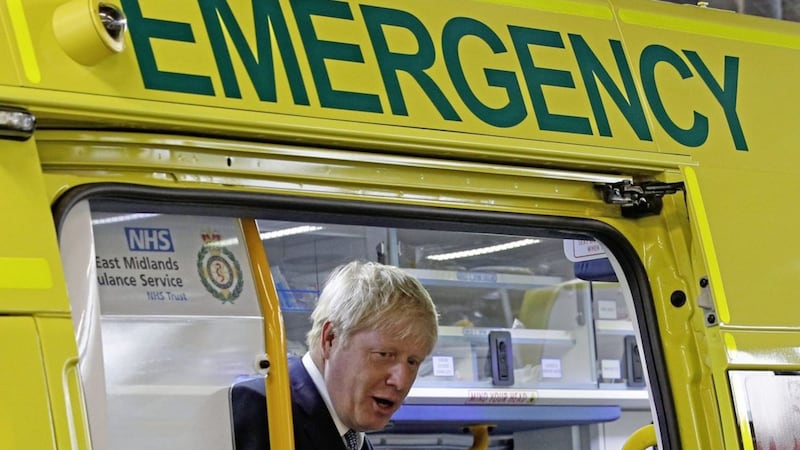If you work in the industry I do and you read about a leaked document which causes a sensation, usually the first questions you ask yourself are: who leaked it and why?
Over the last 48 hours, the big news on these islands has been the revelations contained in the Operation Yellowhammer documents.
This is a set of leaked memos setting out what might accurately be called reasonable worst-case scenarios.
In other words, these predictions are not designed to be sensationalist, but they are based on reasonable assumptions in the event of a no-deal Brexit.
It’s probably worth noting the headlines again.
Logjams caused by months of border delays could “affect fuel distribution”, potentially disrupting fuel supply in the southeast of England.
Up to 85 per cent of lorries using the main Channel crossings “may not be ready” for French customs and could face delays of up to two-and-a-half months.
Port disruption will last up to three months before the flow of traffic “improves” to 50-70 per cent of the current rate.
Petrol import tariffs, which the UK government has set at 0 per cent, will “inadvertently” lead to the closure of two oil refineries, 2,000 job losses, widespread strike action and disruptions to fuel availability.
Medical supplies will “be vulnerable to severe extended delays” as three-quarters of the UK’s medicines enter the country via the main Channel crossings.
The availability of fresh food will be reduced and prices will rise.
Protests across the UK may “require significant amounts of police resource[s]”. Rising costs will hit social care with “smaller providers impacted within 2-3 months and larger providers 4-6 months after exit”. The list goes on.
Both Boris Johnson and Michael Gove have come out since and said that the documents are old – dating back to the last government.
They have also stressed that an extra £2bn of government spend has been made available since.
I am reliably informed that is true and the memos do date back several months. The source of the leak is being blamed on disaffected former Tory ministers – all of whom have denied any wrongdoing.
No doubt the leaks are designed to damage Boris and his government, and the timing is opportune given the meetings due to take place this week around Europe. Will they have any long-term effect on whether Boris stays or goes? I doubt it.
What is most important from a local perspective is the ongoing concern here about a no-deal exit. The memos foresee the return of a hard border because current plans to avoid widespread checks will prove “unsustainable”. The memos state that this may spark protests, road blockages and “direct action”.
There can be no doubt that the damage of a no-deal will be felt much more acutely here than in Britain. This was made explicitly clear in the Northern Ireland Civil Service’s comprehensive assessment circulated to the local political parties in March this year. Indeed, the phrase used was ‘much more severe’.
Brexit really has been a finger in the wind matter for me and my business. I don’t like admitting it, but our planning has been minimal, perhaps because we don’t export our services much and where we do, they are not tariff-driven, nor are they likely to be.
I don’t employ anybody outside of this jurisdiction either or depend on or buy any goods or services in significant amounts from the EU. This is an altogether different scenario from many of our clients though.
And there can be no doubt that some sectors could have catastrophic damage done to them in a no-deal scenario. The agri-food sector, a very large employer and important contributor to the economy here, will be very badly damaged.
Since the referendum, I have always expected border checks to be reintroduced in some shape or fashion and they are inevitable to some extent, assuming the EU insists on its border inspection posts for regulatory reasons (food safety/compliance etc) - though these checks, I’m told, might not have to be immediately at the border.
The much bigger problem for our economy and the agri-food sector is we can’t mitigate against an asymmetrical border.
In other words, if you have tariffs going north to south but not south to north as envisaged in the UK government’s temporary tariff regime then you have our agri-food producers getting hit with a forty percent price hike for their exports straight away (World Trade Organisation tariffs in the agricultural sector are 40 per cent).
In a relatively low-margin sector like agri-food, that is a lights-out scenario. The only way to mitigate against it (apart from ensuring it doesn’t happen either by cancelling Brexit or getting a deal) is by throwing money at the problem. In other words, lots of subsidies for our agri-food sector.
Is that going to happen in large enough numbers to protect the jobs and the suffering companies? Given all the other problems created by a no-deal scenario, I just can’t see this place being given such priority.
Maybe I’m wrong.
Or maybe we’ll get a deal. Or maybe, miraculously, all the ‘remain’ MPs will get together and cancel Brexit altogether. Now I’m dreaming, I think.
The best we can do here in the short-term is lobby hard on behalf of this region and no doubt, the most important part of that from my perspective is protecting jobs and the exporting companies we have worked so hard to make competitive over many years.
Co-ordination and a coherent and consistent voice are crucial in that regard. And the odd media leak always adds a bit of colour and controversy too…
:: Paul McErlean (paul @mcepublicrelations.com) is managing director of MCE Public Relations Ltd








